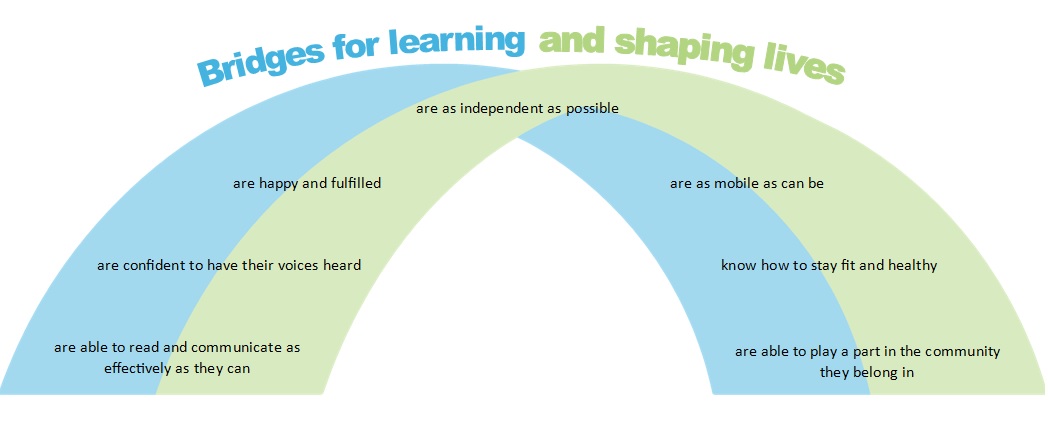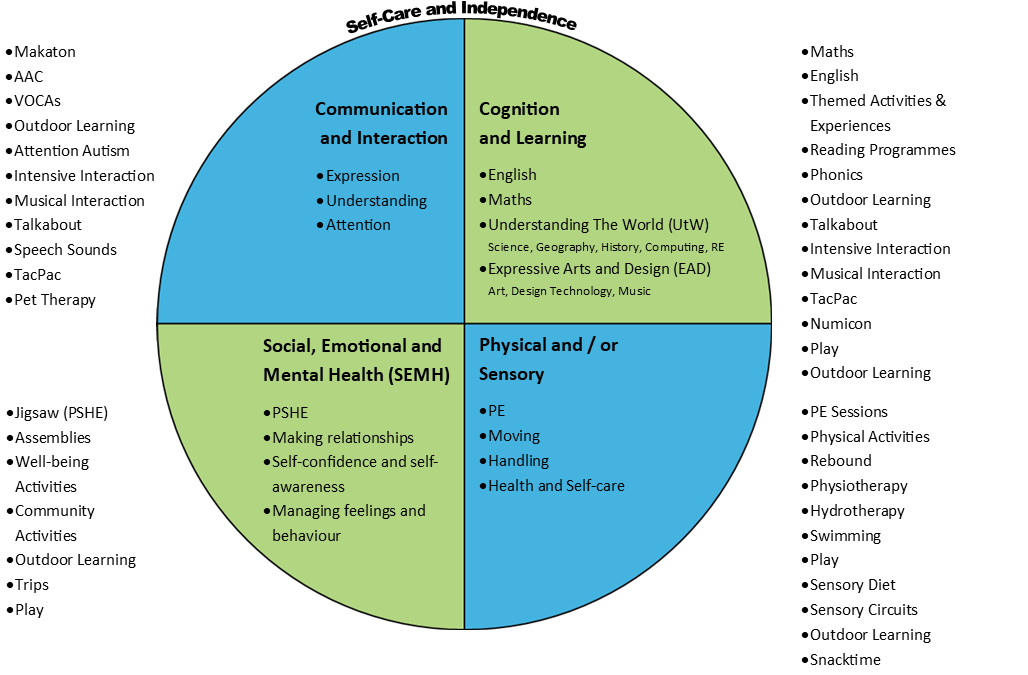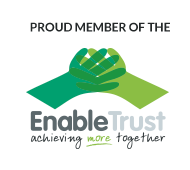The Curriculum
Two Bridges Academy is a specialist provision for pupils aged between 2-19 years. Our curriculum teaches what matters for learners at Two Bridges Academy, based on areas defined by Education, Health & Care Plans (EHCPs).
Each of these areas are important to ensure holistic learning and development. Please note that self-care-care and independence is embedded throughout all of these.
|
Communication and Interaction |
|
Cognition and Learning |
|
Social, Emotional and Mental Health (SEMH) |
|
Sensory and / or Physical Development |
Curriculum Intent
The curriculum at Two Bridges Academy aims to ensure learners have the skills they need to become adults who:

A holistic personalised curriculum that provides all pupils with the best possible opportunities to develop and reach their individual goals. Pupils develop communication and independence skills so that they develop a strong connection to the world around them.

Curriculum Implementation
Our curriculum is based on a developmental model, appropriate for learners at early cognitive developmental stages and links to EHCP outcomes are strongly embedded. It is taught throughout 12 subject areas. For our youngest learners - and those who benefit from a play and sensory-based curriculum -these areas are taught in a cross curricular way. Older pupils may be taught through distinct curriculum subjects, according to their need.

Theme overviews ensure that across the year pupils' learning is enriched by elements of all the EYFS Areas of Learning/ National Curriculum areas so that pupils are engaged and stimulated throughout their learning journeys at Two Bridges Academy. Two Bridges Academy’s curriculum is run on a three year rolling cycle of themes with different theme overviews for pupils on both the Primary and Secondary sites. The theme overviews ensure the curriculum coverage is progressive throughout the school and that the curriculum is relevant and meaningful.
Our three year rolling cycle of themes for both Primary and Secondary pupils can be seen below:
|
Term |
1 |
2 |
3 |
4 |
5 |
6 |
|
|
Cycle 1 |
Primary |
Pets |
Celebrations |
Brazil |
In the Woods |
On the Farm |
At the Seaside |
|
Secondary |
Me and My Friends |
Staying Healthy |
In the African Desert |
Thornbury |
Farm to Fork |
Reduce, Reuse, Recycle |
|
|
Cycle 2 |
Primary |
All about me |
Celebrations |
India |
Circus |
Under the Sea |
At the Park |
|
Secondary |
Mexico |
Me and My Body |
In the Rainforest |
Bristol |
Fashion and Textiles |
Plants– Lets Grow |
|
|
Cycle 3 |
Primary |
Autumn |
Celebrations |
Night Time |
Transport |
In the Jungle |
In the Garden |
|
Secondary |
In the Sky |
Styles of Music |
Snow and Ice |
London |
Weather and Climate |
Let’s go on Holiday |
|
Although the outcomes in their EHCP and Personalised Learning Goals (PLG) are the key focus for our pupils, the National Curriculum subjects provide a breadth of learning and experiences through which to achieve their PLG targets. The subject areas are covered in a cross curricular way based on the different levels of ability and learning pathways.
The three learning pathways address learners’ cognitive developmental levels, while age appropriate content ensures their chronological developmental needs are met. Personalised activities engage learners and flexibility is built into our curriculum in order to adapt to the complex and ever changing needs of our pupils.
|
Pathway: Explorer |
Pathway: Discovery |
Pathway: Adventure |
|
· Pre-formal learners at very early cognitive developmental stages · Non-subject specific · Multi-sensory approaches to holistic learning themes support learning—Immersive learning experience. · Pupils might engage in this over an extended period of time |
· Semi-formal learners acquiring early learning skills · Learning is themed and experiential · Repetition or ‘over-learning’ supports the consolidation and generalisation of skills and knowledge |
· Formal learners entering into more subject specific learning in some areas. |
|
Learners in P16 all follow the Preparation for Adulthood curriculum |
||
Our curriculum is sequenced to ensure learning is cumulative. Our personalised curriculum and pathways approach means that we are able to assess the quality of our curriculum through individual pupil outcomes. To ensure progress is challenging and aspirational, pupils will be set a target for each area of their EHCP. This is based on their pathway and the progress made by pupils on that pathway in their previous academic year.





